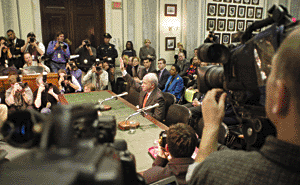A Silver Lining?

The Enron saga reached a crescendo last week when former Enron chairman Kenneth Lay appeared on Capitol Hill and declined to testify at a hearing on the Houston energy giant's collapse into bankruptcy. For years, Andersen provided Enron both consulting and accounting/audit services. But uncertainties about Andersen's dual relationship with Enron could sway many businesses to dodge such entangling alliances and turn to independent companies,rather than Big Five firms,for IT services, solution providers say.
"There is no way this is a bad thing for us," said Nick Padgett, CFO of Inforte, a Chicago-based e-services provider. "We haven't seen the full impact of it yet, but as it plays out it can only help [us."
Mel Bergstein, CEO of technology consulting firm DiamondCluster International, Chicago, said he expects new business opportunities to surface in the wake of the Enron-Andersen scandal.
"This will create business opportunities for all the independent firms. We intend to get our share of that," Bergstein said. "Everybody has a game plan for going after this business. We are looking at who the auditors [at many companies are and trying to figure out if they have consulting people [on-site."


A 21-year Arthur Andersen veteran who co-founded DiamondCluster eight years ago, Bergstein estimates that about 20 percent to 50 percent of the consulting business at the large accounting firms comes from their audit clients. Still, few Big Five customers are likely to have a knee-jerk reaction to the Enron-Andersen debacle and bring in new IT consulting partners immediately, he added.
"If you are working with the same consultant and auditor, you don't want to throw away all that investment. There is going to be some sort of transition," Bergstein said.
Some of the Big Five, however, have expedited a transition of their own amid the Enron affair.
Over a period of several days starting in late January, Deloitte Touche Tohmatsu, Arthur Andersen and PricewaterhouseCoopers disclosed moves to sever ties between their consulting and accounting/audit businesses.
Deloitte, which previously had maintained that it could better serve clients by keeping accounting and consulting operations together, said on Feb. 5 that it would separate the two businesses. Company executives acknowledged that the fallout from the Enron-Andersen scandal harms the entire sector.
"In the discussions we had with our people, we said there could be disruptions [in business opportunities, but only if we allow ourselves to be distracted," said Stephen Sprinkle, global director of strategy, innovation and eminence at Deloitte Consulting.

\
Former Enron chairman Kenneth Lay appeared on Capitaol Hill last week and refused to testify about the company's financial collapse.
Andersen, which remains under fire for its alleged involvement in the Enron implosion, said on Feb. 3 that it would no longer accept consulting projects to design and implement "financial information systems" for "publicly traded U.S. audit clients." And just days earlier, on Jan. 31, PricewaterhouseCoopers,the largest accounting firm,unveiled plans to file an IPO for its PwC Consulting unit in the spring.
KPMG and Ernst and Young, the other Big Five firms, already have separated their accounting and consulting businesses. KPMG spun off its KPMG Consulting arm as a public company last February, and Ernst and Young sold its IT consulting and services unit to Cap Gemini in May 2000.
Because of the Big Five's hasty retreat from potential conflicts of interest, some solution providers are licking their chops. In a meeting with financial and technology analysts last week, EDS Chairman and CEO Dick Brown said he sees "a lot of business coming EDS' way" as Big Five consultants wrestle with independence issues magnified by the Enron-Andersen saga.
"Anyone who thinks that accounting and consulting will stay connected is in denial," Brown told analysts. "There is gold in them hills."
EDS' A.T. Kearney management consulting arm expects to pick up some business amid the Big Five's accounting and consulting split, said Bram Bluestein, executive vice president at A.T. Kearney. While the amount of new business to be had remains unclear, Bluestein said "the discontinuity looks like it will be pretty significant." For example, he said, one client recently called and asked A.T. Kearney to bid on a request for proposal to which the consultancy previously lacked access.
Similarly, regional solution providers stand to draw more attention because of the pall of notoriety hanging over Andersen and,by extension,the rest of the Big Five, said Vince DeRose, president of Peak Resources, a Denver-based solution provider.
"End users are going to start understanding the value of specialized, localized solution providers and IT consultants, instead of relying on behemoths like the Andersens of the world," DeRose said.

\
'This [Enron-Andersen scandel will create business opportunities for all the independent firms. We intend to get out share of that.' --Mel Bergstein, DiamondCluster
Customers "don't need an Andersen to tell them whether they should buy an IBM or a Sun platform, and they certainly don't need an Andersen to implement it," he said, noting that smaller, specialized players can offer identical services at lower costs.
Steven Israel, executive vice president at New York-based integrator AMC, couldn't agree more. Though an e-business consultant from Andersen or PricewaterhouseCoopers might charge as much as $500 per hour vs. AMC's $250 per hour, the caliber of the work would be the same, he said.
For instance, in 1999, one longtime AMC client enlisted one of the large accounting firms to bid on an assessment of its IT infrastructure, but the report detailing the project "looked like the New York telephone directory," Israel said. AMC countered with a proposal that saved the client several million dollars and still provided the same services, he said.
The competitor's fees were so high that "it was like taking candy from a baby" to win the deal, Israel added.
AMC stands to snare more business as it bests Big Five spin-off consulting firms in competitive situations and as those companies subcontract work to solution providers, Israel said. "The only time [the Big Five win is when they are playing golf with the Ken Lays of the world," he said. "If it is truly apples to apples, then solution providers will beat the consulting companies hands down."
Yet some industry executives note that Enron's collapse also will inflict pain on the high-tech arena, as the businesses of solution providers, their vendor partners and their customers feel the financial sting.
Sapient CEO Jerry Greenberg said the Cambridge, Mass.-based e-services firm,which posted a $29.5 million loss for the fourth quarter of 2001,has lost business because of the Enron fiasco.
"We do work in the energy trading area. There has been impact from other clients where they have had to [re-examine their own profit-and-loss [statements," Greenberg said, explaining that not all of those clients have been able to continue IT projects Sapient had started.
Oli Thordarson, president of Alvaka Networks, a Huntington Beach, Calif.-based MSP, pointed to the recent slide in the major capital markets, triggered in part by the Enron debacle. "That's a reflection of the lack of investor confidence. That affects a company's ability to raise equity or cash or to borrow money. It makes everyone skittish," he said.
A company nervous about earnings often cuts IT spending first, and such reductions "could abort this rebound in IT spending that we've been seeing" in recent weeks, Thordarson said. Declining stock prices also tarnish companies' stock option and 401k plans, which in turn affect their ability to hire, develop new technologies and grow revenue, he added.
Harvey Najim, president and CEO of Sirius Computer Solutions, a San Antonio-based solution provider, isn't coveting new business from the Enron-Andersen fallout. Instead, Najim said he's more concerned about the mounting paranoia over increased accounting scrutiny by the Securities and Exchange Commission and other regulators.
"There are a lot of people out there worried as hell about whether the financial statements of the company they work for are inflated or if their 401k is OK," he said. "That's sending a lot of nervousness throughout a lot of companies."
Despite such concerns, other solution providers say they have no qualms about actively pursuing Big Five consulting customers that are leery of conflict-of-interest issues.
"This is an awesome opportunity to attack," said one Boston-based solution provider, who asked not to be identified. "We have targeted many companies for whom we've identified the auditor, and we're going after [their consulting business."
Peter Misek, a software research analyst at Toronto investment firm Scotia Capital, said "the opportunity is billions of dollars" for solution providers looking to capitalize on the Big Five's accounting/consulting divorce. A former Deloitte consultant, Misek said that the amount of cross-selling between the accounting and consulting sides is significant and, in fact, that Deloitte staff were compensated based on the amount of cross-selling they did. "That model is gone," he added.
Over the next six months, there will be some dramatic shifts in IT consulting and services market share, Misek predicted. "Every board of directors meeting's first topic is going to be, 'Who are our auditors, and who are our consultants?' " he said.
AMY ROGERS, STEVEN BURKE, BARBARA DARROW and JEFF O'HEIR contributed to this story.